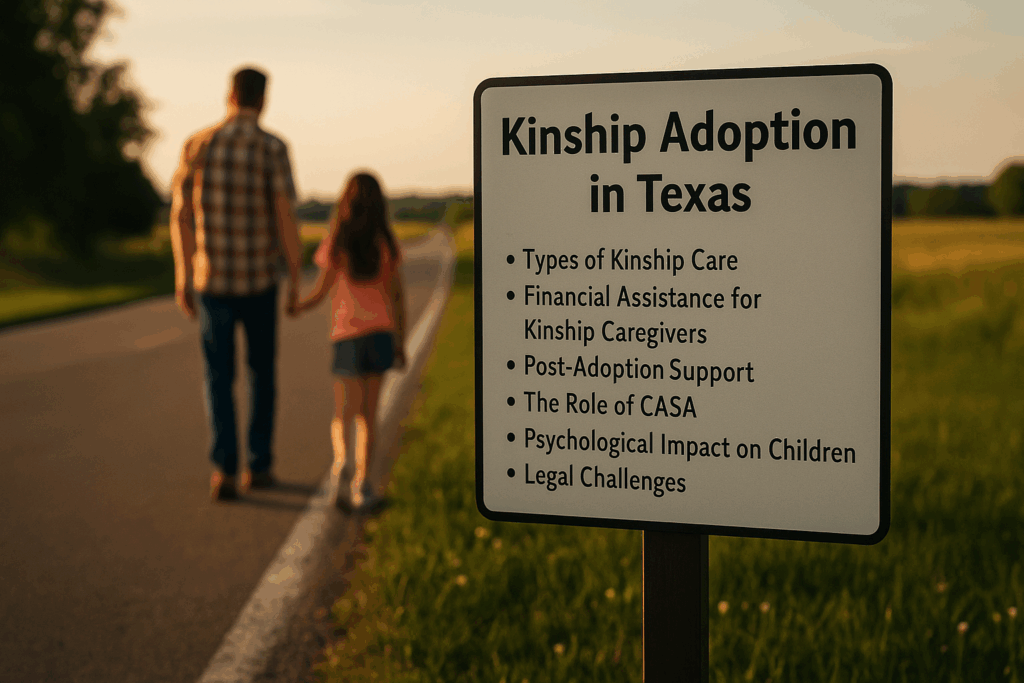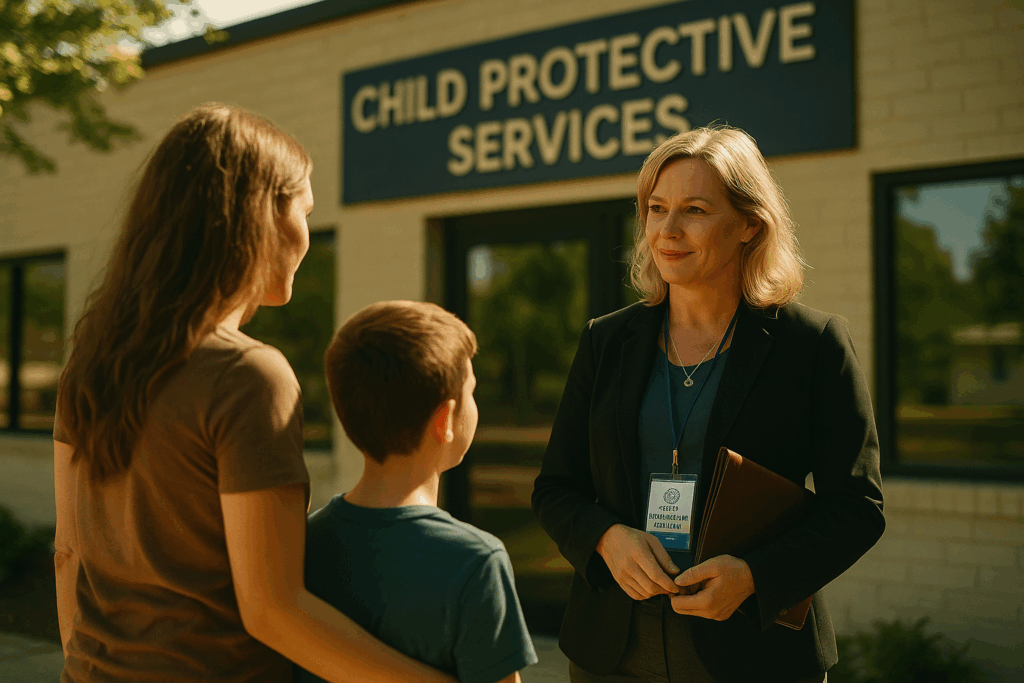
Ever wondered what it feels like to step in and become the hero your family needs? Picture this: you’re sipping your morning coffee when your niece’s school calls, asking why she’s missing class—again. You rush over, scoop her up, and suddenly realize you’re doing far more than “a little babysitting.” You’re the one keeping her world from falling apart. That’s the heart of kinship adoption in Texas—when relatives transform from caregivers to lifelong champions.
In this post, you’ll discover how kinship adoption allows grandparents, aunts, uncles, and even older siblings to gain full legal rights, all while preserving the child’s sense of home and identity. In short: kinship adoption is the legal lifeline that keeps kids connected to the people who love them most. By the end, you’ll know exactly what steps you need to take, the emotional hurdles to anticipate, and the resources available to guide you—and your child—through every twist and turn.
Stick around because we’re serving up clear, no-fluff answers on eligibility requirements, the step-by-step court process, and practical tips for smoothing transitions—from the courthouse to the classroom. You’ll read real-life stories that prove a relative’s love can outshine any stranger’s, learn how to tap into financial support programs, and see why teaming up with a savvy Texas family law attorney—like our team at The Law Office of Bryan Fagan, PLLC—can make all the difference. Ready to turn uncertainty into action? Let’s dive in.
Key Takeaways
- Kinship adoption in Texas prioritizes placing children with relatives, emphasizing the importance of maintaining familial connections for emotional stability.
- Eligibility for kinship adoption requires adoptive relatives to be at least 18 years old, residents of Texas, and to have lived with the child for at least six months before adoption.
- The kinship adoption process involves filing a petition, completing a home study, and obtaining a final court hearing to ensure the child’s best interests are met.

Talk to an Adoption Attorney
Have questions about adoption? We’re here to help. Schedule a consultation today to receive expert legal guidance specific to your adoption journey.
Understanding Kinship Adoption in Texas
Kinship Adoption in Texas allows a child to be adopted by a close relative—such as a grandparent, aunt, uncle, or sibling—while preserving vital family connections that are often lost in traditional adoption scenarios. Unlike other forms of placement, kinship adoption focuses on keeping the child within their extended family, supporting emotional security and continuity. Under Texas Family Code § 162.001(b)(1), this type of adoption is permitted when it’s in the child’s best interest, offering a stable and legally protected relationship within the family unit.
Child Protective Services (CPS) often prioritizes kinship caregivers when a child is removed from their biological parents, assuming the placement is safe and appropriate. This preference helps protect the child’s sense of identity and reduces the trauma that can come with foster placement or institutional care. As our family law team frequently advises, relatives who step in during these times provide not only legal care but a deep sense of belonging that promotes long-term development and emotional resilience.
When kinship adoption is finalized, the relative gains full parental rights, allowing them to make critical decisions regarding the child’s health, education, and upbringing. This legal recognition is essential to protect both the caregiver and the child. Beyond the legal benefits, kinship adoption strengthens intergenerational ties and gives children the chance to grow up in a familiar, loving environment—something courts and professionals alike recognize as vital for child welfare.
For families navigating this process, it’s essential to understand post-adoption obligations as well. We recommend exploring Navigating Texas Post-Adoption Requirements: Essential Guidelines for Parents for helpful insights. And for more information on related adoption scenarios, check out our blog on grandparent adoption in Texas. At The Law Office of Bryan Fagan, PLLC, we’re here to guide you with both legal clarity and compassionate support every step of the way.

Eligibility Requirements for Kinship Adoption
In Texas, several eligibility requirements must be met for kinship adoption:
- Grandparents, aunts, uncles, siblings, and other relatives are eligible to adopt a child within their family.
- The adopting adult must be at least 18 years old and a resident of Texas.
- If the adopting adult is married, both spouses must file the petition together, emphasizing the importance of providing a stable family unit.
Before the adoption can be granted, the child must have lived with the petitioner for a minimum of six months. Additionally, consent from the child’s biological parents or legal guardians is generally required unless their parental rights have been terminated. In certain cases, the court may waive the residency requirement if it is in the child’s best interest. The laws governing kinship adoption for family members are the same as those for other types of adoption, and a request for consent may be necessary.
Adoptive parents must also demonstrate their ability to provide a safe and stable home environment. Age and marital status are basic requirements for adopting a relative in Texas. These criteria ensure that the adoptive parents understand the responsibilities and commitments involved in providing for a child’s well-being.
Meeting these requirements enables kinship caregivers to navigate the adoption process successfully and provide a responsible, loving, permanent home for the child to happen.
Termination of Parental Rights
Before a kinship adoption can proceed in Texas, the parental rights of the child’s biological parents must be terminated. This legal process is essential to transfer full legal authority to the kinship caregivers, enabling them to make decisions regarding the child’s welfare. The termination of parental rights can be either voluntary, known as relinquishment, or involuntary, initiated by CPS or other legal entities.
The termination process requires a court order and must adhere to strict legal requirements outlined in Chapter 161 of the Texas Family Code. Voluntary termination occurs when the biological parents willingly give up their parental rights, often recognizing that it is in the child’s best interest. Involuntary termination, on the other hand, may occur if the parents are deemed unfit due to neglect, abuse, or other significant factors.
Once parental rights are terminated, kinship caregivers gain the legal authority to provide medical care, make educational decisions, and ensure the overall well-being of the child. This step is crucial in the adoption process as it provides the legal framework that supports the child’s transition into a stable and supportive family environment, including considerations for the biological parent.
The Kinship Adoption Process
Kinship Adoption in Texas follows a clearly defined legal process meant to ensure the child’s safety, stability, and long-term well-being—while keeping them connected to trusted family members. According to Texas Family Code § 162.003, eligible relatives such as grandparents, siblings, aunts, or uncles may file to adopt a child, provided the court determines that adoption is in the child’s best interest. The journey begins with filing an adoption petition, continues with a mandatory home study, and concludes with a final court hearing where a judge evaluates whether the adoption should be finalized.
As our family law team often advises, every step in this process plays a critical role. Filing the petition officially initiates the legal proceedings, while the home study—required under § 162.003(b)—ensures the adoptive home is safe, stable, and appropriate for the child’s needs. The final hearing gives the court an opportunity to review all documentation and evidence before issuing an adoption decree that transfers full parental rights to the relative caregiver.
Families interested in a deeper look at how this process unfolds can explore our dedicated page on relative adoptions in Texas, which outlines the legal steps, required forms, and support available through our office. With knowledgeable legal representation, kinship adoption can be a smooth and empowering experience—one that protects both the child’s emotional well-being and your legal rights as a caregiver.
If you’re just beginning to explore this path, you may also want to read our blog post on how long it takes to adopt a relative in Texas. At The Law Office of Bryan Fagan, PLLC, we’re committed to making sure families have the resources, clarity, and compassionate legal support they need to move forward with confidence.

Filing the Adoption Petition
The first step in the kinship adoption process is filing the adoption petition. This involves gathering necessary documentation, such as proof of kinship and financial stability. Essential documents include the Petition for Adoption and the child’s birth certificate. These documents provide the legal basis for the adoption and demonstrate that the adoptive parents are prepared to take on the responsibilities of caring for the child.
Additionally, criminal background checks are required to ensure the safety and well-being of the child. This step helps verify that the adopting relatives have no history of behavior that could jeopardize the child’s welfare. Experienced lawyers play a crucial role in this phase, assisting families by preparing the necessary legal documents and representing them in court throughout the adoption process.
By filing the adoption petition correctly, kinship caregivers can set a solid foundation for the subsequent steps in the adoption journey. This step is critical in demonstrating the family’s commitment to providing a secure and loving home for the child.
Completing a Home Study
Completing a home study is a mandatory step in the kinship adoption process in Texas. The purpose of the home study is to ensure that the adoptive parents are capable of providing a stable and nurturing environment for the child. This process involves evaluating the living situation, financial stability, and overall readiness of the adoptive parents.
The home study process includes several steps, such as interviews, home visits, and background checks. During this evaluation, adoptive parents must demonstrate their ability to offer a secure and loving home environment. Child Protective Services (CPS) plays a crucial role in this process, assessing the safety and suitability of the home.
Successfully complete the home study enables adoptive parents and adults to move forward in the adoption process with confidence, knowing they meet the same standards for providing a stable and supportive school website home.
Final Court Hearing
The final court hearing is the culminating step in the kinship adoption process. During this hearing, the judge finds the adoption case serves the child’s best interests. The judge assesses all aspects of the adoption, including the home study findings and the suitability of the adoptive parents to determine the best outcome.
The court hearing serves to finalize the adoption process, ensuring that all legal standards are met and that the child’s future is secure. Once the judge approves the adoption, the child becomes a permanent member of the adoptive family, marking the beginning of a new chapter filled with love and stability.
Legal and Emotional Benefits of Kinship Adoption
Kinship Adoption in Texas provides families with the unique opportunity to create lasting legal bonds while preserving the emotional and cultural connections that matter most to a child’s well-being. One of the central goals of kinship adoption—as outlined in Texas Family Code § 162.003—is to maintain continuity in a child’s life by placing them with relatives they already know and trust. This approach minimizes disruption and allows children to remain rooted in their family traditions, community, and identity, which can be especially critical during times of family upheaval.
When a child is adopted by a relative, they benefit from a sense of permanence and safety. Unlike foster placements, kinship adoption helps eliminate the uncertainty of future relocations and provides a legal structure that supports long-term emotional security. Children often thrive when they remain connected to their heritage and history, and kinship placements empower adoptive families to nurture those connections every day. At the same time, relatives who adopt often find a renewed sense of purpose and joy in stepping into a caregiving role for a child they already love deeply.
From a practical standpoint, licensed kinship caregivers in Texas may qualify for financial assistance through programs supported by CPS, including subsidies and medical benefits. These resources can help offset the costs of raising a child and are often more readily available when adoption is pursued through formal legal channels. As our attorneys regularly remind clients, working with a knowledgeable legal team can help ensure that all available support is accessed and that every requirement is met under the law. For a breakdown of eligibility and legal pathways, we invite you to explore our detailed page on relative adoptions in Texas.
To learn more about financial support options and state resources for adoptive relatives, check out our blog on how kinship caregivers can access Texas adoption subsidies. At The Law Office of Bryan Fagan, PLLC, our mission is to guide families through every legal step with clarity, compassion, and confidence—because when families stay together, futures get stronger.

Role of Child Protective Services (CPS) in Kinship Adoption
In many cases of Kinship Adoption in Texas, the involvement of Child Protective Services (CPS) is an essential starting point. When a child is removed from their biological parents due to abuse, neglect, or other concerns, courts are required under Texas Family Code § 262.201(g) to give priority consideration to placement with a relative. This legal framework is designed to reduce the trauma children experience when separated from their parents by allowing them to remain in familiar surroundings, often with relatives they already trust and love.
Kinship caregivers frequently begin as temporary placements through CPS but may later seek to formalize their role through adoption. Transitioning from temporary custodianship to legal parenthood helps secure the child’s long-term stability and grants the relative full parental rights and responsibilities. According to the attorneys at our firm, this shift can be life-changing for both the child and caregiver—but it requires careful navigation of the CPS process, court requirements, and post-placement evaluations outlined in Texas Family Code Chapter 162.
The path to a successful kinship adoption is often strengthened by local and faith-based communities. One inspiring example involved a Texas community that rallied to finalize 70 adoptions from the foster care system, many of them through kinship placements. This kind of community support highlights how vital strong relationships are—not only in the home but across neighborhoods and support networks. These stories are a testament to the transformative power of committed families and compassionate advocacy.
If you’re exploring Kinship Adoption in Texas, whether you’re in DeSoto or elsewhere, we encourage you to seek guidance early in the process. For deeper insight into navigating CPS involvement, see our article on what happens when CPS removes a child in Texas. At The Law Office of Bryan Fagan, PLLC, our team is here to help you turn a temporary placement into a forever home—protecting your rights and the future of the child you love.

Real-Life Examples and Testimonials
Real-life stories continue to show just how powerful Kinship Adoption in Texas can be. In one inspiring example, a Texas community finalized the adoptions of 70 children, many of whom were placed with relatives through kinship care. This remarkable outcome wasn’t achieved through paperwork alone—it was made possible by the strength of local support systems, dedicated caregivers, and trusted legal advocates working together to prioritize the best interests of each child, as required under Texas Family Code § 162.002(b).
At The Law Office of Bryan Fagan, PLLC, we’ve walked beside many families on this deeply personal journey. One client—a grandmother seeking to adopt her special needs grandson—shared how our legal team helped her navigate every phase, from preparing the initial petition to meeting Texas home study requirements and presenting her case in court. With our support, she was able to provide the security and permanence her grandson needed, all while preserving their close family bond.
Stories like these are more than testimonials—they’re proof that kinship adoption is often the most compassionate and stabilizing option for children who can no longer live with their biological parents. The process can feel overwhelming, but with experienced legal guidance and access to the right resources, families are empowered to overcome the legal and emotional hurdles involved in formalizing their role as caregivers.
For more on how Texas law supports the adoption of relatives with special needs, we encourage you to read our blog on what is required to adopt your special needs grandson in Texas. You can also explore our resource on grandparent adoption in Texas, which offers guidance for relatives taking that brave first step. As our team knows well, every child deserves a stable home—and every family deserves a trusted advocate to help build it.

How The Law Office of Bryan Fagan, PLLC Can Help
When it comes to Kinship Adoption in Texas, having the right legal guidance can make all the difference. At The Law Office of Bryan Fagan, PLLC, our attorneys understand both the emotional weight and the legal complexity involved in adopting a grandchild, niece, nephew, or other close relative. From ensuring that all required filings comply with Texas Family Code § 162.001 to guiding families through home studies, court proceedings, and post-adoption requirements, we are dedicated to helping families secure a stable future for the children they love.
For relatives seeking to adopt, the process can be daunting—especially when dealing with issues like the termination of parental rights or coordinating with CPS. Our legal team offers step-by-step support to ease that burden. Whether we’re drafting a petition, preparing clients for hearings, or resolving legal disputes, our goal is to keep families informed, empowered, and protected at every stage of the journey. That’s why so many clients turn to us when they’re ready to transition from temporary caregiving to permanent parental rights.
Our firm’s compassionate and client-focused approach ensures that families aren’t just meeting procedural requirements—they’re making decisions that reflect what’s best for the child involved. We understand that kinship adoption isn’t just a legal process; it’s a lifelong commitment rooted in love, responsibility, and family heritage. With our support, families can move forward with confidence, knowing that their case is being handled with care and legal precision.
If you’re considering adopting a grandchild or another relative, we recommend reviewing our comprehensive guide on how to adopt a grandchild in Texas for a clear breakdown of what’s involved. You may also find our resource on Texas adoption requirements helpful as you prepare. At every step, The Law Office of Bryan Fagan, PLLC is here to support your family’s future—because when relatives step up, they deserve a legal team that stands with them.
Conclusion:
Becoming the rock your family leans on isn’t always part of the plan—but it just might be one of the most meaningful things you ever do. Kinship adoption in Texas isn’t about being perfect; it’s about showing up, stepping in, and saying, “I’ve got you.” Whether you’re a grandparent trying to stabilize your grandchild’s life or an aunt ready to bring your niece into a forever home, you’re not alone—and you don’t have to figure it out all by yourself.
If this article sparked questions or gave you the nudge to explore next steps, that’s a sign you’re on the right path. The legal journey doesn’t have to be confusing or overwhelming when you’ve got the right people in your corner. At The Law Office of Bryan Fagan, PLLC, our team is here to walk with you, answer the hard questions, and make sure your heart-driven decision is supported by smart, strategic legal action.
So if you’re standing at the edge of “what now?”—take a deep breath, and let’s talk. Because protecting your family’s future starts with one empowered step forward… and maybe a strong cup of coffee.
Your family’s next chapter is waiting—and we’re here to help you write it.
Kinship Adoption in Texas – Frequently Asked Questions
Kinship adoption in Texas refers to the legal process where a relative, such as a grandparent, aunt, uncle, or sibling, adopts a child to provide a permanent and stable home. This process allows the child to maintain familial connections and cultural identity while ensuring their safety and well-being.
The cost of kinship adoption in Texas can vary. If the adoption is through the foster care system, it may be free or low-cost. Private kinship adoptions can range from $500 to $1,500, depending on legal fees and home study requirements.
Kinship caregivers in Texas may receive financial assistance through programs like Permanency Care Assistance (PCA), which offers monthly payments ranging from $400 to $545 per child, depending on the child’s needs. Additional support may include Medicaid coverage and other benefits.
The approval process for kinship care in Texas can take several weeks to a few months. It involves background checks, home assessments, and training requirements to ensure the caregiver can provide a safe and nurturing environment for the child.
Kinship adoption offers numerous benefits, including preserving family ties, providing emotional stability for the child, and reducing the trauma associated with separation from familiar caregivers. It also allows for continuity in the child’s cultural and community connections.
Yes, grandparents can adopt their grandchildren in Texas. The process involves terminating the parental rights of the child’s biological parents, completing a home study, and obtaining court approval to finalize the adoption.
Kinship adoption is relatively common in the United States. According to the U.S. Department of Health and Human Services, over one-third of children in foster care are placed with relatives, highlighting the importance of kinship care in child welfare.
The most affordable way to adopt a child in Texas is through the foster care system. Adopting through foster care often involves minimal costs, and families may receive financial assistance, including subsidies and support services.
Kinship caregivers in Texas typically receive monthly payments to assist with the costs of caring for the child. The exact amount and duration of payments depend on the specific assistance program and the caregiver’s eligibility.
Bryan Fagan is a Texas family law attorney with a heart for adoption—inspired not just by his legal career, but by his own family story. Growing up in Atascocita with two adopted brothers, Bryan learned early the profound meaning of chosen family. His passion for justice was sparked by John Grisham’s The Pelican Brief, and he became the first lawyer in his family, balancing night classes at South Texas College of Law while caring for his grandmother with Alzheimer’s.
Today, Bryan brings that same dedication to his practice, guiding families through adoptions, custody disputes, divorces, and complex marital agreements. A certified member of the College of the State Bar of Texas, he combines elite legal expertise with genuine empathy—drawing from his roles as a husband, father of three, and advocate for families facing false CPS allegations.
Based in Houston, Bryan is actively involved in the Houston Bar Association’s Family Law Sector and statewide family law organizations. Whether finalizing an adoption or protecting parental rights, he believes the law should reflect the deepest values of home, commitment, and love.

